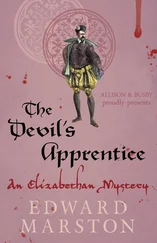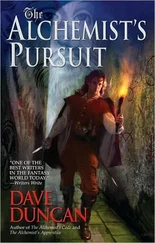Dave Duncan - The Alchemist's Apprentice
Здесь есть возможность читать онлайн «Dave Duncan - The Alchemist's Apprentice» весь текст электронной книги совершенно бесплатно (целиком полную версию без сокращений). В некоторых случаях можно слушать аудио, скачать через торрент в формате fb2 и присутствует краткое содержание. Жанр: Детективная фантастика, на английском языке. Описание произведения, (предисловие) а так же отзывы посетителей доступны на портале библиотеки ЛибКат.
- Название:The Alchemist's Apprentice
- Автор:
- Жанр:
- Год:неизвестен
- ISBN:нет данных
- Рейтинг книги:3 / 5. Голосов: 1
-
Избранное:Добавить в избранное
- Отзывы:
-
Ваша оценка:
- 60
- 1
- 2
- 3
- 4
- 5
The Alchemist's Apprentice: краткое содержание, описание и аннотация
Предлагаем к чтению аннотацию, описание, краткое содержание или предисловие (зависит от того, что написал сам автор книги «The Alchemist's Apprentice»). Если вы не нашли необходимую информацию о книге — напишите в комментариях, мы постараемся отыскать её.
The Alchemist's Apprentice — читать онлайн бесплатно полную книгу (весь текст) целиком
Ниже представлен текст книги, разбитый по страницам. Система сохранения места последней прочитанной страницы, позволяет с удобством читать онлайн бесплатно книгу «The Alchemist's Apprentice», без необходимости каждый раз заново искать на чём Вы остановились. Поставьте закладку, и сможете в любой момент перейти на страницу, на которой закончили чтение.
Интервал:
Закладка:
“If messer would be so kind as to follow me?” The captain led the way.
The ground floor of the palace is put to mundane uses. The stables are there, the guardrooms, and two sets of prison cells. The Wells are by far the worst of the jails, small stone kennels without windows, damp and dark and airless. They stink most horribly.
That eastern wing is very old and the stairs that lead from the Wells all the way to the top of the palace are steep, narrow, and oddly haphazard, as if they have been reorganized many times over the centuries. They are not intended to impress, because they are never seen by anyone except the fanti and their prisoners. Winding back and forth in the near-darkness, I had to concentrate on where I was putting my feet and soon lost count of what floor we were on.
The second story is mostly occupied by the bureaucracy-the High Chancellor and his staff of secretaries and notaries. The Golden and Silver Books are maintained there, for instance, and another office will issue the permits you need to do anything more than breathe. The third floor belongs to government, for it includes the doge’s apartments and meeting rooms for magistrates and many councils, including the appeal courts and the Great Council itself. The fourth story is where the Collegio and the Senate meet, and also the Council of Ten.
Above those are attics containing the prison cells known as the Leads because they are directly under the great sheets of lead that cover the roof. It is not true, though, that the inmates bake in summer and freeze in winter. These cells are used for gentlemen prisoners, mostly political offenders, and they are not uncomfortable as prisons go. The room to which I was conducted was spacious enough, although utterly barren. I scanned it hastily by the light of the guards’ lanterns. The walls were of heavy planks and the only furnishings, if you could call them that, were a bucket in one corner and a crucifix hanging on the wall opposite the door. A small grilled window admitted sounds of rain. The lights were withdrawn, the door banged, the lock clattered, and I was alone in the dark.
Most inmates would be terrified at that point. I was merely furious. My tarot had warned me of Justice reversed. Deciding that the floor was the best place to sit, since I had no other choice, I huddled myself down in a corner, as small as possible. I hated to dirty my cloak, but I was shivering too much to think of removing it. The vermin that swarmed in summer were mercifully absent.
My next decision required more thought. I had two options-I could wait there in my cell until I was taken down to appear before the tribunal, taking the risk that it would send me straight back up to the torturers. If that happened, my ensuing experiences were likely to be both unpleasant and prolonged, since I had no idea where my master had gone and to confess to assisting him in the black arts would be suicide.
Or I could leave.
Here I must digress to list the three laws of demonology, with apologies to those of you who already know them. Firstly, you can summon and direct a fiend if you know his true name and a few simple precautions. Secondly, being evil incarnate, the demon will do anything he can to defeat your purpose; he will always strive to deceive and betray you. And thirdly, accepting favors from a fiend will weaken your hold over him and let him gain power over you. That is how Faust was damned. The only defense against being possessed is purity of purpose.
After teaching me those rules, my master told me the name of a minor demon. I shall not repeat it here-it is unpleasant to say, leaving a foul taste in the mouth, and writing it down might cause the paper to go on fire. I shall refer to him as Putrid. Putrid is not especially powerful as fiends go, but I could command him to whisk me to anywhere in the Republic, either within the city or in the territories it controls on the mainland, or even to foreign states beyond its borders. There I should have to make a new life for myself. Any life that came from Putrid would be nasty and brutish. Understand?
In my present circumstances, I had even more problems. The Maestro might have called on demonic aid for his escape from Ca’ Barbolano; he knows the names of many fiends more potent than Putrid. I hoped he had used some other sorcerous technique, one that did not risk his immortal soul, for he has many arts that he has not yet shared with me.
Putrid was all I had, though. I had no means of inscribing a pentacle, which is a sensible precaution, although neither essential nor foolproof. The crucifix on the wall would make a summoning difficult at best, perhaps impossible. I concluded that Putrid had better remain a last resort for the time being. I wedged my head back in the corner and went to sleep.
The bell tower of San Marco stands just across the Piazzetta from the palace, and I was jarred awake by the clang of the great Marangona bell announcing the start of a new day. The first light of a winter dawn was creeping in through the grilled window. A few minutes later, the lock rattled again and the door creaked. So did my neck.
“You are summoned!” the guard announced.
“How about some breakfast?” I grumbled.
“There might be some left when you return, if you’re still hungry.”
Back down those dark, contorted stairs I went, stumbling after my solitary guide’s lamp. Before we had gone far, he threw open a door and I was dazzled by a blaze of daylight. There, in a fine meeting room where magnificent paintings hung on leather-covered walls and others shone overhead in gilt-framed ceiling panels, a man sat on one of the benches, obviously waiting for me. He rose to greet me; then he tilted his head slightly and regarded me with distaste.
“There has been a mistake,” he said with hauteur. “I was expecting a sier Alfeo Zeno.”
“Your prayers have been answered,” I said.
In Venice people are defined by their costumes. A tradesman does not dress like a shopkeeper or a courtesan like a lady. It mattered that I was stubbled, tangled, and rumpled, but it mattered much more that I was dressed as an apprentice, not a nobleman. He, on his part, looked both splendid and ridiculous, because his beard was streaked with white and he had to be at least fifty, yet he was decked out like a youth. His spindly calves were enclosed in full-length silk hose, his gaudy tunic and fur-lined brocade surcoat barely reached to his thighs, and his bonnet bulged almost as high as mine. He was, in fact, clad in the livery of a ducal equerry, a member of the doge’s official entourage who does everything from guarding his bedchamber to showing visitors around the palace and marching in parades. He thought he was magnificent, but he looked silly to me. I knew most of the equerries by sight, but not this one.
“This is the right man, clarissimo,” the guard said.
The equerry shrugged. “Well, His Serenity did mention something about an astrologer. Obviously astrology doesn’t pay well.”
He was sneering. After an unearned night in jail, I resented that. “And obviously you fought at Famagusta.”
Bull’s-eye! The equerry started. “How do you know that?”
“From the stars. Are we keeping the doge waiting?”
He shot a worried glance at the guard and crossed himself. “If you would be so kind, sier Alfeo…” He gestured at the door, very nearly bowing.
I did bow. “Do, please, lead the way, messer equerry.”
A cheap trick, yes, but as my master says, Sometimes a cheap trick is all you can afford. Of course I had been lucky. I do not recall my grandparents, but I had met enough of their friends to hear a trace of Cyprus in the equerry’s Veneziano, and the way he had angled his head when he looked at me reminded me of one of the Maestro’s patients who had suffered an eye injury. The doge had distinguished himself at the disastrous siege of Famagosta, so it was reasonable that he would have given a sinecure job in the palace to a man who had served under him back then, and had since, likely, fallen on hard times.
Читать дальшеИнтервал:
Закладка:
Похожие книги на «The Alchemist's Apprentice»
Представляем Вашему вниманию похожие книги на «The Alchemist's Apprentice» списком для выбора. Мы отобрали схожую по названию и смыслу литературу в надежде предоставить читателям больше вариантов отыскать новые, интересные, ещё непрочитанные произведения.
Обсуждение, отзывы о книге «The Alchemist's Apprentice» и просто собственные мнения читателей. Оставьте ваши комментарии, напишите, что Вы думаете о произведении, его смысле или главных героях. Укажите что конкретно понравилось, а что нет, и почему Вы так считаете.










